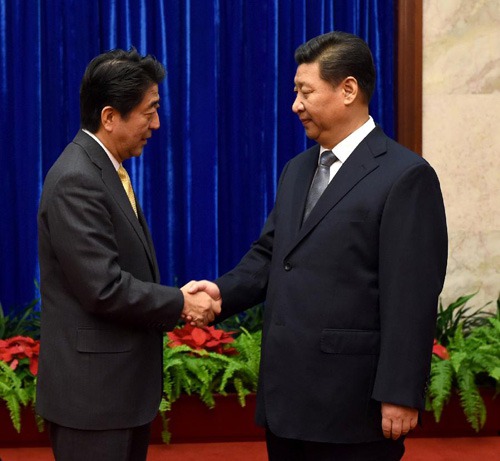 |
|
Chinese President Xi Jinping (right) and Japanese Prime Minister Shinzo Abe hold a meeting at the request of the Japanese side ahead of the 22nd Asia-Pacific Economic Cooperation Economic Leaders' Meeting in Beijing on November 10 (MA ZHANCHENG) |
Chinese President Xi Jinping and Japanese Prime Minister Shinzo Abe on Monday held a meeting at the request of the Japanese side ahead of the 22nd Asia-Pacific Economic Cooperation (APEC) Economic Leaders' Meeting.
China hopes that Japan continues to follow the path of peaceful development and adopt prudent military and security policies, Xi told Abe.
To build stable and healthy bilateral relations, Xi said, China and Japan must conform to the progressive trend of the times.
He urged Japan to "do more things that help enhance the mutual trust between Japan and its neighboring countries, and play a constructive role in safeguarding the region's peace and stability."
"Severe difficulties have emerged in Sino-Japanese relations in recent two years and the rights and wrongs behind them are crystal clear," Xi said.
He noted that both sides have reached a four-point agreement to improve bilateral ties, and expressed hope that the Japanese side would properly handle related issues in line with the agreement.
The meeting came after a four-point agreement reached last week by China and Japan, which agreed to resume political, diplomatic and security dialogue while acknowledging different positions on the Diaoyu Islands.
The Chinese president stressed that the history issue "bears on the national sentiment of the over 1.3 billion Chinese people," as well as regional peace, stability and development.
He said Japan must follow the political documents between China and Japan and honor the commitments made by successive Japanese administrations, including a speech by former Japanese Prime Minister Tomiichi Murayama in which he stated that Japan, through colonial rule and aggression, had caused great damage and suffering to people of many countries, particularly in Asia, and that no such mistake should be made in the future.
Only in this way could Japan develop friendly and forward-looking ties with its Asian neighbors, he said.
Noting that China and Japan are close neighbors, Xi said stable and healthy development of Sino-Japanese ties is in line with fundamental interests of people in both countries as well as the common aspiration of the international community.
He said the Chinese Government has always attached importance to its ties with Japan, and has advocated pushing forward Sino-Japanese ties on the basis of the four political documents reached between China and Japan and in the spirit of "taking history as a mirror and looking forward to the future."
The four political documents refer to the China-Japan Joint Statement inked in 1972, the China-Japan Treaty of Peace and Friendship of 1978, the China-Japan Joint Declaration of 1998 and a joint statement on advancing strategic and mutually-beneficial relations in a comprehensive way that was signed in 2008.
During the meeting with Xi, Abe said Japan is determined to continue the path of peaceful development, noting that the current Japanese administration will maintain the same views held by previous governments on the history issue.
Japan is willing to implement the four-point agreement reached between China and Japan, properly handle related issues and make it the new starting point for promoting the improvement and development of the strategic and mutually-beneficial relations between Japan and China, Abe said.
"China's peaceful development is a significant opportunity for Japan and the world," he told Xi.
He also said Japan supports China in hosting a successful APEC Economic Leaders' Meeting.
The Sino-Japanese political relations have strained since the Japanese government's "purchase" of the Diaoyu Islands in September 2012. Abe's visit last year to the Yasukuni Shrine, which honors WWII war criminals, also had a serious impact on the bilateral ties.
In the spirit of "facing history squarely and looking forward to the future," the two sides have reached some agreement on overcoming political obstacles in the bilateral relations, according to the four-point agreement reached between China and Japan on November 7.
Experts have considered the four-point agreement a result of mounting domestic and international pressure on the Abe administration.
(Xinhua News Agency November 10, 2014)
| 